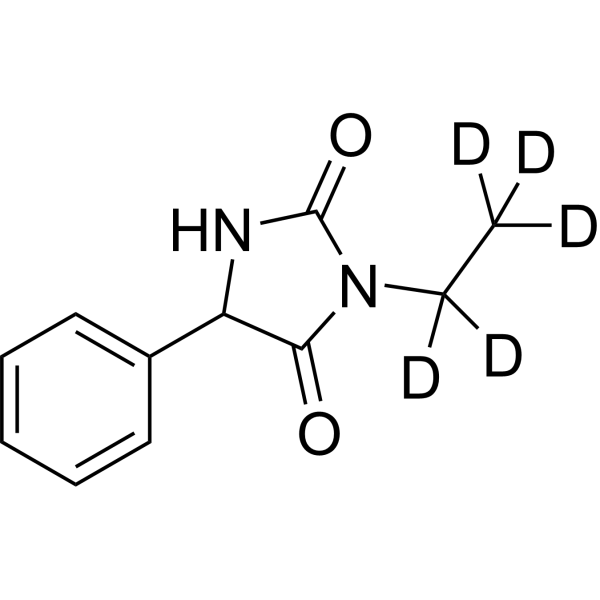| Description |
Ethotoin-d5 is the deuterium labeled Ethotoin[1]. Ethotoin (Peganone) is an orally active anticonvulsant agent used in epilepsy research, Ethotoin is a hydantoin, similar to phenytoin[2].
|
| Related Catalog |
|
| In Vitro |
Stable heavy isotopes of hydrogen, carbon, and other elements have been incorporated into drug molecules, largely as tracers for quantitation during the drug development process. Deuteration has gained attention because of its potential to affect the pharmacokinetic and metabolic profiles of drugs[1].
|
| In Vivo |
After dosing Ethotoin on gestational day 18, offspring exhibits mild mortality and weight loss[2]. Animal Model: Pregnant Sprague-Dawley CD rats[2] Dosage: 600 mg/kg Administration: Oral gavage, 600 mg/kg, once Result: Preweaning mortality for Ethotoin was 2.0%, Ethotoin -exposed animals weighed approximately 6.6% less than controls.
|
| References |
[1]. A S Troupin, et al. Clinical pharmacology of mephenytoin and ethotoin. Ann Neurol. 1979 Nov;6(5):410-4. [2]. Russak EM, et al. Impact of Deuterium Substitution on the Pharmacokinetics of Pharmaceuticals. Ann Pharmacother. 2019 Feb;53(2):211-216. [3]. D R Minck, et al. Comparison of the behavioral teratogenic potential of phenytoin, mephenytoin, ethotoin, and hydantoin in rats. Teratology. 1991 Apr;43(4):279-93. [4]. D R Minck, et al. Comparison of the behavioral teratogenic potential of phenytoin, mephenytoin, ethotoin, and hydantoin in rats. Teratology. 1991 Apr43(4):279-93.
|
